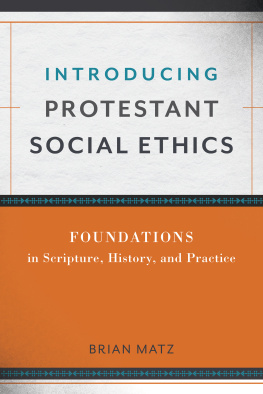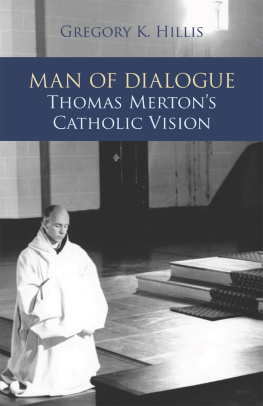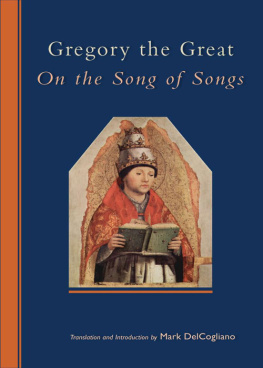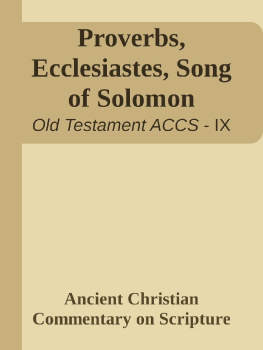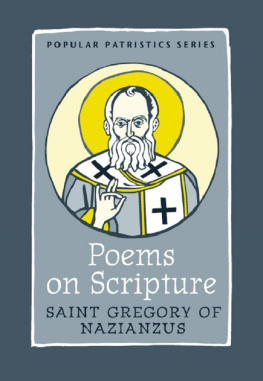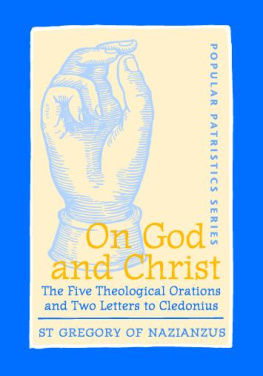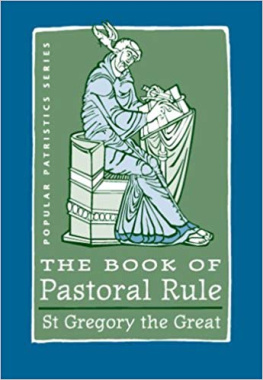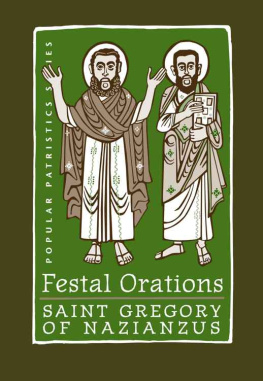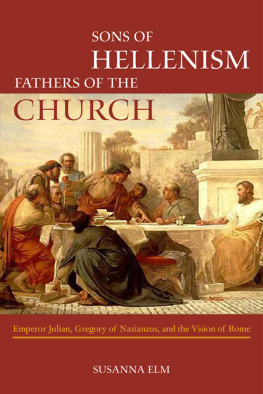Brian Matz - Gregory of Nazianzus
Here you can read online Brian Matz - Gregory of Nazianzus full text of the book (entire story) in english for free. Download pdf and epub, get meaning, cover and reviews about this ebook. year: 2016, publisher: Baker Academic, genre: Religion. Description of the work, (preface) as well as reviews are available. Best literature library LitArk.com created for fans of good reading and offers a wide selection of genres:
Romance novel
Science fiction
Adventure
Detective
Science
History
Home and family
Prose
Art
Politics
Computer
Non-fiction
Religion
Business
Children
Humor
Choose a favorite category and find really read worthwhile books. Enjoy immersion in the world of imagination, feel the emotions of the characters or learn something new for yourself, make an fascinating discovery.
- Book:Gregory of Nazianzus
- Author:
- Publisher:Baker Academic
- Genre:
- Year:2016
- Rating:5 / 5
- Favourites:Add to favourites
- Your mark:
- 100
- 1
- 2
- 3
- 4
- 5
Gregory of Nazianzus: summary, description and annotation
We offer to read an annotation, description, summary or preface (depends on what the author of the book "Gregory of Nazianzus" wrote himself). If you haven't found the necessary information about the book — write in the comments, we will try to find it.
Brian Matz: author's other books
Who wrote Gregory of Nazianzus? Find out the surname, the name of the author of the book and a list of all author's works by series.
Gregory of Nazianzus — read online for free the complete book (whole text) full work
Below is the text of the book, divided by pages. System saving the place of the last page read, allows you to conveniently read the book "Gregory of Nazianzus" online for free, without having to search again every time where you left off. Put a bookmark, and you can go to the page where you finished reading at any time.
Font size:
Interval:
Bookmark:
Foundations of Theological Exegesis and Christian Spirituality
Hans Boersma and Matthew Levering, series editors
A VAILABLE IN THE S ERIES
Athanasius
by Peter J. Leithart
Basil of Caesarea
by Stephen M. Hildebrand
Vincent of Lrins and the Development of Christian Doctrine
by Thomas G. Guarino
2016 by Brian Matz
Published by Baker Academic
a division of Baker Publishing Group
P.O. Box 6287, Grand Rapids, MI 49516-6287
www.bakeracademic.com
Ebook edition created 2016
All rights reserved. No part of this publication may be reproduced, stored in a retrieval system, or transmitted in any form or by any meansfor example, electronic, photocopy, recordingwithout the prior written permission of the publisher. The only exception is brief quotations in printed reviews.
Library of Congress Cataloging-in-Publication Data is on file at the Library of Congress, Washington, DC.
ISBN 978-1-4934-0572-5
For William, Daniel, Sophia, and Katelynn
Cover
Series Page
Title Page
Copyright Page
Dedication
Series Preface
Acknowledgments
Abbreviations
Introduction
1. Gregory as Pastor and Theologian
2. Preaching Purification
3. Preaching Pastoring: Oration 2
4. Preaching Contemplation: Oration 45
5. Preaching Baptism: Oration 40
6. Preaching Love for the Poor: Oration 14
Conclusion
Appendix 1: Scripture Cited in Oration 2
Appendix 2 : Scripture Cited in Oration 45
Appendix 3 : Scripture Cited in Oration 40
Appendix 4 : Scripture Cited in Oration 14
Notes
Select Bibliography
Index
Back Cover
Recent decades have witnessed a growing desire among Orthodox, Catholics, and Protestants to engage and retrieve the exegetical, theological, and doctrinal resources of the early church. If the affirmations of the first four councils constitute a common inheritance for ecumenical Christian witness, then in the Nicene Creed Christians find a particularly rich vein for contemporary exploration of the realities of faith. These fruits of the patristic period were, as the fathers themselves repeatedly attest, the embodiment of a personally and ecclesially engaged exegetical, theological, and metaphysical approach to articulating the Christian faith. In the Foundations of Theological Exegesis and Christian Spirituality series, we will explore this patristic witness to our common Nicene faith.
Each volume of the present series explores how biblical exegesis, dogmatic theology, and participatory metaphysics relate in the thought of a particular church father. In addition to serving as introductions to the theological world of the fathers, the volumes of the series break new ecumenical and theological ground by taking as their starting point three related convictions. First, at the core of the Foundations series lies the conviction that ressourcement , or retrieval, of the shared inheritance of the Nicene faith is an important entry point to all ecumenical endeavor. Nicene Christianity, which received its authoritative shape at the councils of Constantinople (381) and Chalcedon (451), was the result of more than three centuries of ecclesial engagement with the implications of the incarnation and of the adoration of Father, Son, and Holy Spirit in the liturgy of the church. Particularly since the 1940s, when Catholic scholars such as Henri de Lubac, Jean Danilou, and others reached back to the church fathers for inspiration and contemporary cultural and ecclesial renewal, ressourcement has made significant contributions to theological development and ecumenical discussion. The last few decades have also witnessed growing evangelical interest in an approach to the church fathers that reads them not only for academic reasons but also with a view to giving them a voice in todays discussions. Accordingly, this series is based on the conviction that a contemporary retrieval of the church fathers is essential also to the flourishing and further development of Christian theology.
Second, since the Nicene consensus was based on a thorough engagement with the Scriptures, renewed attention to the exegetical approaches of the church fathers is an important aspect of ressourcement . In particular, the series works on the assumption that Nicene theology was the result of the early churchs conviction that historical and spiritual interpretation of the Scriptures were intimately connected and that both the Old and the New Testaments speak of the realities of Christ, of the church, and of eternal life in fellowship with the Triune God. Although today we may share the dogmatic inheritance of the Nicene faith regardless of our exegetical approach, it is much less clear that the Nicene convictionssuch as the doctrines of the Trinity and of the person of Christcan be sustained without the spiritual approaches to interpretation that were common among the fathers. Doctrine, after all, is the outcome of biblical interpretation. Thus, theological renewal requires attention to the way in which the church fathers approached Scripture. Each of the volumes of this series will therefore explore a church fathers theological approach(es) to the biblical text.
Finally, it is our conviction that such a ressourcement of spiritual interpretation may contribute significantly toward offsetting the fragmentationecclesial, moral, economical, and socialof contemporary society. This fragmentation is closely connected to the loss of the Platonic-Christian synthesis of Nicene Christianity. Whereas this earlier synthesis recognized a web of relationships as a result of Gods creative act in and through Christ, many today find it much more difficult to recognize, or even to pursue, common life together. A participatory metaphysic, which many of the church fathers took as axiomatic, implies that all of created reality finds its point of mutual connection in the eternal Word of God, in which it lies anchored. It is this christological anchor that allows for the recognition of a common origin and a common end, and thus for shared commitments. While the modern mind-set tends to separate nature and the supernatural (often explicitly excluding the latter), Nicene Christianity recognized that the created order exists by virtue of Gods graciously allowing it to participate, in a creaturely fashion, in his goodness, truth, and beauty as revealed in Christ through the Spirit. A participatory metaphysic, therefore, is one of the major presuppositions of the creeds articulation of the realities of faith.
In short, rooted in the wisdom of the Christian past, the volumes of the series speak from the conviction that the above-mentioned convictions informed the life and work of the church fathers and that these convictions are in need of ressourcement for the sake of todays theological, philosophical, and exegetical debates. In light of a growing appreciation of the early Christians, the series aims to publish erudite introductions that will be of interest in seminary and university courses on doctrine and biblical exegesis and that will be accessible to educated lay readers with interest in how early Christians appropriated and passed on divine revelation.
Hans Boersma and Matthew Levering, series editors
I owe a debt of thanks to many people for the completion of this project. First of all, I thank Hans Boersma and Matthew Levering for inviting me to contribute this volume on Gregory of Nazianzus to their series. In June 2007, I was working at the Katholieke Universiteit Leuven (Leuven, Belgium) when I read an announcement of the names of scholars in residence coming during the summer months in the faculty of theology. On that list was Hans Boersma, whose name I knew from articles of his I had read as a graduate student several years earlier. I immediately contacted him, and we met several times over his weeks in Leuven. I shared his fascination with some of the things he was researching then, which he has subsequently published, on orthodoxy, neo-orthodoxy, and patristic literature. I could not have known then that, many months later, he would email me with an invitation to write a volume for this series. Thank you, Hans.
Font size:
Interval:
Bookmark:
Similar books «Gregory of Nazianzus»
Look at similar books to Gregory of Nazianzus. We have selected literature similar in name and meaning in the hope of providing readers with more options to find new, interesting, not yet read works.
Discussion, reviews of the book Gregory of Nazianzus and just readers' own opinions. Leave your comments, write what you think about the work, its meaning or the main characters. Specify what exactly you liked and what you didn't like, and why you think so.


